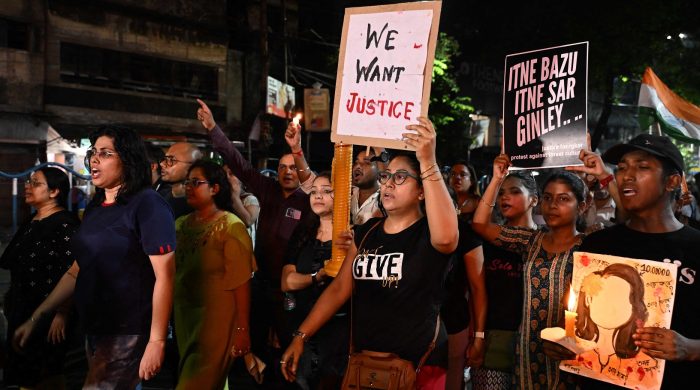Street protests once again reverberate West Bengal towns

- Update Time : Monday, September 9, 2024
- 45 Time View

Hundreds of people, carrying burning torches and singing the national anthem, took to the streets of Kolkata and other towns of India’s West Bengal state at the stroke of midnight of Sunday demanding justice for the R G Kar rape-murder victim.
In an unprecedented show of solidarity on the demand for justice, members of the civil society, many of them in black outfits signifying mourning, poured on on the streets in thousands in numerous places in Kolkata and its suburbs, and in cities such as Siliguri, Durgapur and Kharagpur, as also in the district towns of Balurghat, Purulia, Cooch Behar, and other small towns and hamlets.
Protesters, both women and men, young and old, formed human chains, wrote graffiti on the roads across the state to register their protest against the assault on the young doctor at the Hospital a month ago on August 9.
The song ‘We shall overcome’ and its Hindi and Bengali translations ‘Hum honge kamyab’ and ‘Amra korbo joy’ respectively, were sung at different locations in Kolkata from Garia and Jadavpur in the south to Shyambazar near R G Kar Hospital in the north.
With the Supreme Court scheduled to hear the suo motu case related to the crime later today, many participants in the third instance of ‘Reclaim the night’ in the state said they were confident that justice would be provided by the apex court.
While some named the victim doctor ‘Tilottama’, many others referred to her as ‘Abhaya’ but all were bound by their quest for justice for her.
Every corner of Kolkata was rife with slogans and protests over the August 9 incident as participants switched on their mobile phone flashlights, with many wearing black outfits.
A human chain spanning nearly 14 km was formed from Shyambazar in north Kolkata to Sodepur in the suburbs.
People from all walks of life, from students and teachers, white collar job holders such as IT professionals to rickshaw pullers joined the chorus for justice.
With Durga Puja, the biggest festival in West Bengal, less than a month away, many referred to the victim as the daughter of the Goddess believed to be the incarnation of ‘Shakti’ (power).















